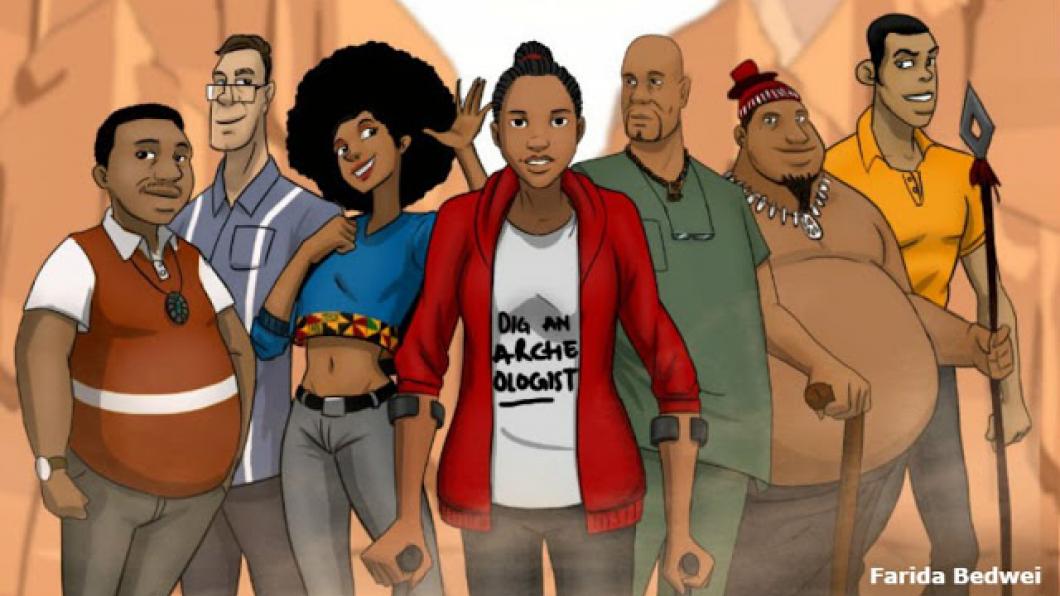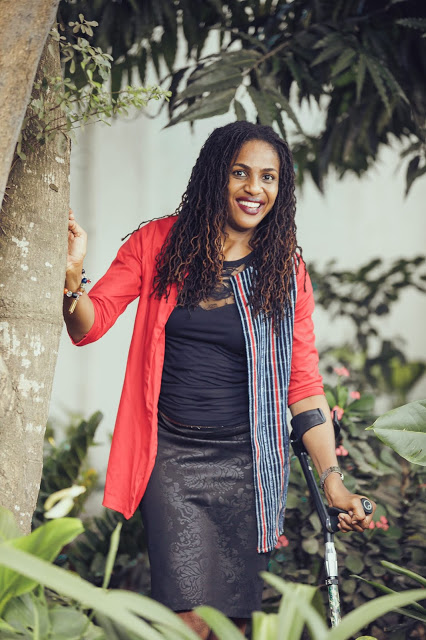
Meet Karmzah, a heroine with cerebral palsy and super powers
By Louise Kinross
Farida Bedwei is a Ghanaian software engineer who's launching a new comic book with a super hero who has a disability. Farida, who has cerebral palsy, loved comics as a child, but never saw any characters who looked like her. So she created Karmzah, a no-nonsense warrior whose crutches give her the power to fight, run, flip and fly. Karmzah will be available online on theAfrocomix app in the Google Play store at the end of October. Farida is on business in Paris, and we spoke over Skype.
BLOOM: How did you get the idea for Karmzah?
Farida Bedwei: I realized there wasn’t representation for super heroes with cerebral palsy. There are a few super heroes who have disabilities. But there are a lot of children and adults who don’t see their disability represented in the world of cartoons and comics. That’s why I decided to come up with this super hero. Growing up, I used to love the comics, but I never felt represented. So I decided to do something about it.
BLOOM: What do you hope readers take away from the comic about disability?
Farida Bedwei: For me, the most important thing is that having a disability doesn’t mean that that is your whole life. We tend to focus too much on what the person can’t do, and miss out on what the person can do.
For most of us with disabilities, we are going to have the disability our whole life, so we have to redefine the way we look at it, and make the best out of it and live our lives to the fullest.
Sometimes we tend to end up resenting our wheelchair or our other aids, because we feel they make us different from any other person. But these devices help us get the independence that we crave, so I made a super hero who gets her power from her crutches. Without her crutches, she loses her power, and becomes like anyone else with cerebral palsy.
I want children to learn how to take pride in the assistive devices they’re using, and not see them as something that is making their lives miserable.
BLOOM: How was disability viewed in Ghana when you grew up?
Farida Bedwei: There was a stigma about it, and there still is. We are very religious in Ghana, and when it comes to children who are born differently, people immediately attribute it to either a curse, or to something that your ancestors or your parents did wrong. That is a mindset that we have to change.
There are people who allow the perceptions of a society to affect their lives, but I’m not one of them. I didn’t let those things bother me.
BLOOM: Was it hard to sell other people on your idea about a disabled super hero?
Farida Bedwei: No, it’s something people have waited for. People are literally asking ‘When is it going to come out?’ because they want to buy it. These are not just people with disabilities or parents of children with disabilities. But people with no relation to disability who are interested in it, and say it’s about time.
I ran into Eyram Tawiah, the CEO of a local comic book and animation studio called Leti Arts at an event in August. We got talking, and I told him about this idea for a comic I had. That is how Karmzah came about, less than two months later.
BLOOM: Who illustrates the book?
Farida Bedwei: It’s done by Leti Arts. I wrote the script and the dialogue, and they do the illustrations based on my scripts.
BLOOM: Was it challenging to have someone else draw your characters?
Farida Bedwei: It was very easy. We have the same mindset, and they are able to make my vision come alive in a great way.
BLOOM: When is the first issue coming out?
Farida Bedwei: It will be available online next week in the Afrocomix app in the Google Play store. The print copy will be ready to be purchased in Ghana in the middle of December. Next year people will be able to purchase the print copy from other parts of the world.
BLOOM: I understand you are a software engineer and the co-owner of Logiciel, which sells a microfinance banking software used by over 200 financial companies in Ghana?
Farida Bedwei: Yes. These companies are smaller than banks, and give loans and financial services to people who run small businesses or don't have a steady income, and who don't qualify for loans from banks.
BLOOM: Do any of your skills as a software engineer lend themselves to launching a new comic book?
Farida Bedwei: No, they are two different areas of my life. They don’t intersect at all.
BLOOM: So is working on your comic book a bit of a reprieve?
Farida Bedwei: Yes. It’s something totally different. It gives me a lot of satisfaction that my life isn’t just about writing code. Sometimes you need to add something to make your life more exciting.
BLOOM: How often will the comic come out?
Farida Bedwei: We are planning on four issues every year.
BLOOM: Would you say Karmzah’s personality is like yours?
Farida Bedwei: I don’t know. I guess someone who knows me would be a better person to answer that. I try not to write about myself, but I guess eventually you end up adding a bit of yourself. Karmzah is a no-nonsense person who solves problems and fights bad guys.
BLOOM: What advice would you give parents raising children with a wide range of disabilities?
Farida Bedwei: I would tell them to treat their child as normally as possible, because although the child has a disability, the child is a child first. Enjoy them. We all want the same thing: we want to be loved and we want to feel that we can achieve anything in the world. As much as you can, give your child the freedom to be who he or she wants to be.
